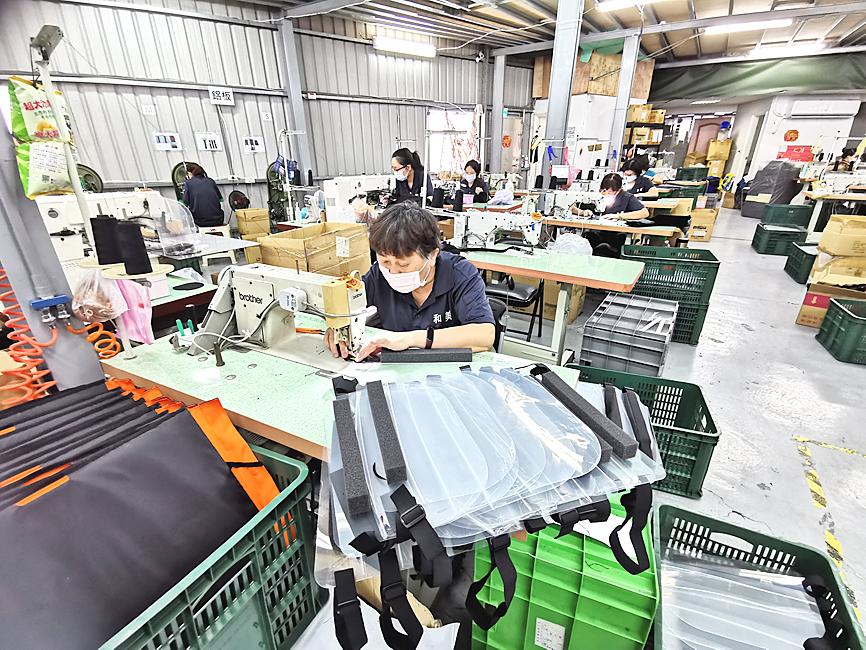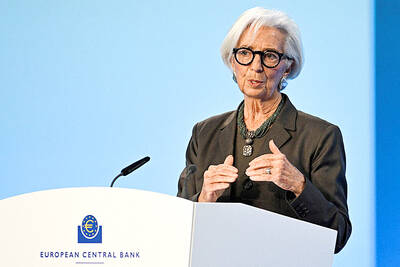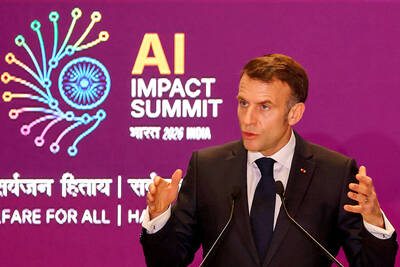The nation’s manufacturing purchasing managers’ index (PMI) last month slowed to 57.6 from 62 in May, as companies continued to see business improve, but at the slowest pace in seven months due to the COVID-19 pandemic, IHS Markit said yesterday.
The growth momentum could cool further until operating conditions normalize, the international research body said in a report.
“The latest PMI data indicated that growth momentum softened across Taiwan’s manufacturing industry at the end of last quarter, with output and new orders both rising at the slowest rates since August last year,” IHS Markit economics associate director Annabel Fiddes said in a press release.

Photo: Wu Chun-feng, Taipei Times
The PMI report aims to capture the health of manufacturing sectors, with values larger than 50 suggesting expansion and points below the threshold indicating contraction.
Weighing on the headline index was a notably slower expansion in production, the report said, adding that the latest increase, though solid, was the softest since August last year.
Respondents indicated that production schedules were affected by raw material shortages, as well as the recent rise in domestic COVID-19 cases.
At the same time, growth in new work also slowed to a 10-month low, with companies saying the outbreak weakened domestic demand.
New export sales also rose at a weaker pace, albeit still robust overall, the report said.
Supply chain delays remained severe, with lead times for inputs deteriorating at one of the fastest rates on record, it said.
Firmer demand for inputs, low inventory levels at vendors and COVID-19 restrictions impeded supplier performance, the report said.
Difficulties in obtaining inputs drove companies to stock inventories and help push up input costs, the report said.
Input cost hikes remained rapid due to more expensive raw materials and transportation services, it said.
Companies by and large opted to pass cost burdens onto clients in the form of increased output charges, although inflation subsided compared with May.
Companies expanded their payroll at a pace that was little changed from one month earlier, the report said. The increase had to do with efforts to meet growing customer demand and capacity pressures persisted, as evidenced by a marked increase in work backlogs, it said.
Taiwanese manufacturers are generally upbeat about business one year ahead, but the degree of confidence slid to an eight-month low, IHS Markit said.
Many firms expect global conditions to gradually emerge from the COVID-19 pandemic, but voiced concern that local infections might hamper growth, it said.

European Central Bank (ECB) President Christine Lagarde is expected to step down from her role before her eight-year term ends in October next year, the Financial Times reported. Lagarde wants to leave before the French presidential election in April next year, which would allow French President Emmanuel Macron and German Chancellor Friedrich Merz to find her replacement together, the report said, citing an unidentified person familiar with her thoughts on the matter. It is not clear yet when she might exit, the report said. “President Lagarde is totally focused on her mission and has not taken any decision regarding the end of

French President Emmanuel Macron told a global artificial intelligence (AI) summit in India yesterday he was determined to ensure safe oversight of the fast-evolving technology. The EU has led the way for global regulation with its Artificial Intelligence Act, which was adopted in 2024 and is coming into force in phases. “We are determined to continue to shape the rules of the game... with our allies such as India,” Macron said in New Delhi. “Europe is not blindly focused on regulation — Europe is a space for innovation and investment, but it is a safe space.” The AI Impact Summit is the fourth

CONFUSION: Taiwan, Japan and other big exporters are cautiously monitoring the situation, while analysts said more Trump responses ate likely after his loss in court US trading partners in Asia started weighing fresh uncertainties yesterday after President Donald Trump vowed to impose a new tariff on imports, hours after the Supreme Court struck down many of the sweeping levies he used to launch a global trade war. The court’s ruling invalidated a number of tariffs that the Trump administration had imposed on Asian export powerhouses from China and South Korea to Japan and Taiwan, the world’s largest chip maker and a key player in tech supply chains. Within hours, Trump said he would impose a new 10 percent duty on US imports from all countries starting on

STRATEGIC ALLIANCE: The initiative is aimed at protecting semiconductor supply chain resilience to reduce dependence on China-dominated manufacturing hubs India yesterday joined a US-led initiative to strengthen technology cooperation among strategic allies in a move that underscores the nations’ warming ties after a brief strain over New Delhi’s unabated purchase of discounted Russian oil. The decision aligns India closely with Washington’s efforts to build secure supply chains for semiconductors, advanced manufacturing and critical technologies at a time when geopolitical competition with China is intensifying. It also signals a reset in relations following friction over energy trade and tariffs. Nations that have joined the Pax Silica framework include Japan, South Korea, the UK and Israel. “Pax Silica will be a group of nations